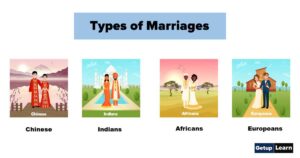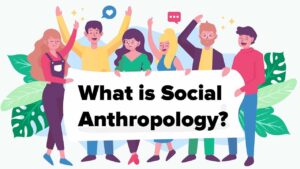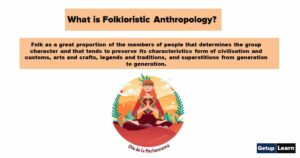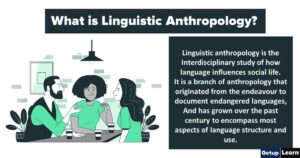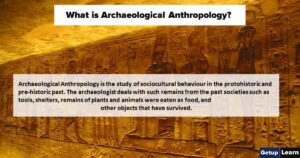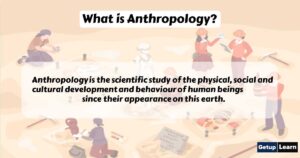Socio-cultural anthropologists are concerned with human social and cultural diversity and the bases of these distinctions, be they economic, political, environmental, biological; social roles, relationships, and social transformation; cultural identity; cultural dimensions of domination and resistance; and strategies for representing and analyzing cultural knowledge.
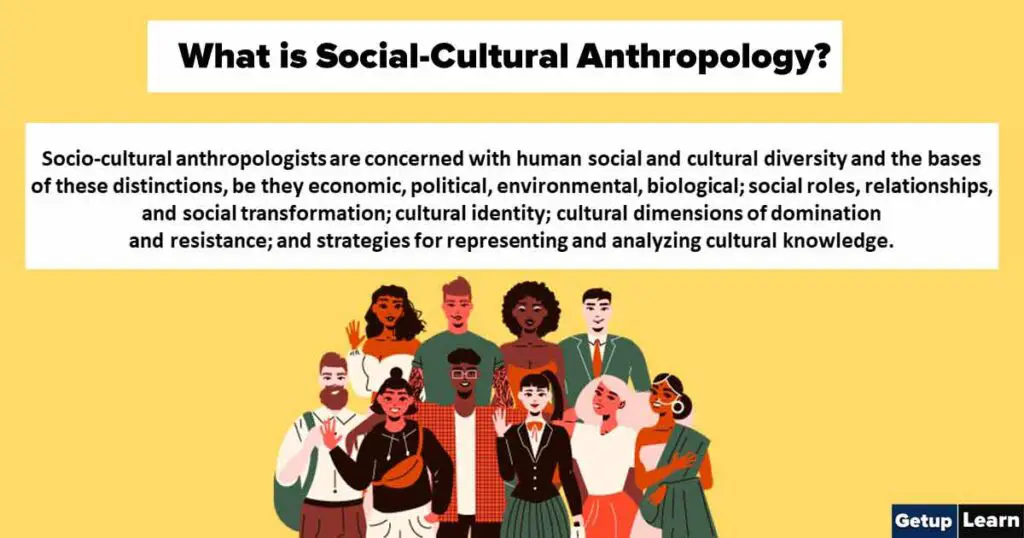
Table of Contents
This is also often called social anthropology or cultural anthropology. It is concerned with the social and cultural dimensions of the living peoples (Pritchard 1995); and with the description and analysis of people’s lives and traditions (Podolefsky and Brown, 1997).
Socio-cultural anthropology studies the social, symbolic, or nonmaterial and material lives of contemporary and historically recent human societies, taking the concept of culture central to its goal (Howard and Dunaif-Hattis, 1992).
There are many other specialized fields of study in social or cultural anthropology.
Some of these include anthropology of art, medical anthropology, urban/rural/economic anthropology, political anthropology, development anthropology, anthropology of religion, legal anthropology, demographic anthropology, ecological anthropology, psychological anthropology, ethnomusicology, etc.
Theories of Sociocultural Anthropology
- Evolutionism
- Diffusionism
- Historical Particualrism
- Functionalism
- Culture and Personality
- Neo-Functionalism
- Marxist Anthropology
- Cultural Ecology
- Cultural Materialism
- Structuralism
- Ethnoscience
- Symbolic Anthropology
Evolutionism
Evolutionism is a set of ideas or doctrine concepts of Evolution. It is a sequential, directional, and gradual occurring process. It is the process of systematic change. In cultural and social anthropology the gradual, structural change of human culture is the subject of study by evolutionists.
Evolutionism dominated anthropological thinking mainly during the latter part of 19th century. In fact, some argue that the growth of anthropology as a science is tied up with the development of the doctrine of evolution; neither could have developed with out the other (Calverton, 1931).
The 19th-century evolutionary theory in anthropology had especially two prominent proponents, who developed what is termed as unilineal evolution. These were Edward B. Tylor and Lewis Henry Morgan. Unilineal evolution is the view that societies evolve in a single direction toward complexity, progress, and civilization.
Diffusionism
Diffusionism developed in early part of 20th century; it was also interested in explaining why societies are at similar or different stages of development. This theory maintained that societal change occurs when societies borrow cultural traits from one another. Cultural knowledge regarding technology, economy, religious views, etc, diffuses or spreads from one society to another.
This may explain the similarities in cultural features between societies. Some extreme line of thought in this theory, called the British diffusionism, argued that all sorts of civilization originated in Egypt and spread to other societies. The weakness of this theory, like evolutionism, was that it was ethnocentric in its assumptions.
The diffusionists believed that nonwestern societies are inherently inferior, saying that these peoples are not innovative in creating civilizations. However, diffusionism has some validity in that it helps to explain the emergence of classical civilizations such as those in Egypt, Greece, and Rome (Howard and Dunaif-Hattis, 1992; Scupin and DeCorse, 1995).
Historical Particualrism
This theory developed in early 20th century mainly in reaction to unilineal evolution. An American anthropologist, named Franz Boas, pioneered it. This theory provided an alternative to the question of why societal differences and similarities exist. Boas greatly influenced the development of anthropology in the 20th century.
He strongly opposed the unilineal evolutionary theory, and advanced the need for empirical field-based ethnographic research to explain and understand each society and culture in its historical contexts. Historical Particualrism thus maintains that each society has its own particular historical development. This view led to the development of the idea of cultural relativism (ibid.)
Functionalism
This perspective is one of the dominant theories both in sociocultural anthropology and sociology. The theory regards culture as an integrated whole (Howard and Dunaif-Hattis, 1992), and tries to explain how the relationships among the parts of society are created and how these parts are functional (meaning having beneficial consequences to the individual and the society) and dysfunctional (meaning having negative consequences).
The theory sees society as a complex system whose parts work together to promote solidarity and stability; it states that our social lives are guided by social structure, which are relatively stable patterns of social behavior (Macionis, 1997).
All social structures contribute to the operation of society. Two dominant British anthropologists in functionalism were Radcliff Brown and Bronslaw Malinowski, representing two strands in the theory: structural functionalism, which stresses the preeminence of society and its structure over the individuals, and how the various elements of the social structure function to maintain social order and equilibrium; and psychological functionalism, which stresses individual needs to be met by society.
The weakness of functionalist theory was that it failed to explain why societies different or similar. Functionalist anthropology assumed an orderly world, paying little or no attention to competition and conflict (Howard and Dunaif-Hattis, 1992).
The theory was ahistorical, neglecting historical processes. (Scupin and DeCorse, 1995) The theory was also unable to explain social and cultural change, as it viewed society as stable and unchanging. Despite these weaknesses, functionalism influenced a great deal of empirical research in anthropology.
Culture and Personality
This perspective, also called psychological anthropology has enjoyed dominance in the history the field, particularly in the first half of 20th century. The proponents of the culture and personality school maintained that the various patterned aspects of culture shape the personality of individuals within a given society, and also personality once developed could in turn affect the further development of culture (Hammond 1971). The theory is an outgrowth of the search for the mechanism of cultural integration (Howard and Dunaif- Hattis, Op cit).
The theory was influenced by and neo-Freudian psychology, which emphasized the primacy of infantile and early childhood experience in shaping the personality. Following the development of this school, many anthropologists attempted to study the national characters (representative personality types) across cultures. In so doing, anthropologists have employed the psychological concepts such as conditioned stimuli and responses, drives, rewards, punishments, conflicts, dreams, ego systems, id impulses, attitudes, values, cognitive orientations, ideas, etc (Clifton 1968).
Early influential contributors to the culture and personality perspective such as Bronslaw Malinwoksi and Margaret Mead attempted to show that psychological traits vary widely across cultures; that societies instill different values by training children differently. Adult personalities reflect a culture’s child-rearing practices (Kottak, 1994).
Neo-Functionalism
This theory is a variety of theories of conflict in anthropology, which developed after the II World War. It developed in response to the weakness in functionalist anthropology in dealing with the issues of conflict, competition and disequilibrium. Proponents of this theory criticized functionalists for disregarding conflict as an inherent part of social organization.
Neofunctionalists succeeded in bringing into light the issue of conflicts and change, but they still failed to deal with the issues of fundamental structural changes. Social order was considered a given, rather than something be explained (Howard and Dunaif-Hattis 1992).
Marxist Anthropology
Marxist anthropological theory derives directly or indirectly from the writings of Karl Marx. Basing some of his ideas on the 19th century evolutionary thinking, Marx stated that societies pas through different stages of development. This theory is basically materialistic as it assumes that the systems of producing material goods influences and shapes society.
Unlike functionalists who stressed order, stability and equilibrium in society, Marxist anthropology argued that society is in constant struggle of social class conflicts among the dominant and minority groups in society.
Unlike neo-functionalists, Marxist anthropologists “are concerned specifically with the transformation of social orders and the relationships between conflict and cultural evolution” ( Ibid. P.372). Current Marxian anthropologists reject the unilineal model of societal development suggested by Marx.
Some of Marx’s predictions regarding the socialist and communist stages of societal development happened to be wrong. Despite these shortcomings, the Marxian analytical approach is valid to understanding societal development (Scupin and DeCorse 1995).
Cultural Ecology
The school of cultural ecology, also termed as neoevolutionism, attempts to explain the human condition in relation to the environment. Broadly defined, cultural ecology refers to “the dynamic interrelationship between man and the material and cultural components of his environment” (Hammond, 1971: 397).
An extreme view of this school argued that the environment determines culture. However, anthropologists now reject the idea of geographical determinism. The main idea behind the modern school of cultural ecology is that each culture is seen as a specific instance of patterned adaptation to a specie environment; the dynamic interaction between man and his environment is such that culture modifies the environment and the latter also puts its limits to human culture.
Cultural Materialism
The theory of cultural materialism may be regarded as an outgrowth of neo-evolutionism or cultural ecology. Anthropologist Marvin Harris mainly advanced it. The theory states that the key factors in and determinants of socio-cultural evolution are the infrastructures that include technology, environment and material conditions. As the infrastructure of a society changes, the other aspects of society also change accordingly.
Structuralism
Structuralism is one of a new group of theories in anthropology known as studies of cognitive structure. This schools of thought, including structuralism, ethnosciecne, and symbolic anthropology, give attention to the cognitive or underlying mental structures that provide order to culture.
Structuralism, advanced by its famous French structuralist anthropologist, Claude Levi-Strauss, states that “the origin of universal principles that order the ways in which we behave and think about the world is to be found in the structure of human thought.”(Howard and Dunaif-Hattis, 1992:373).
The problem with this theory is that they view societies as static and do not help very much in explaining variation among societies. The theory treats culture as a given order and fails to explain the adaptive dimensions of culture.
Ethnoscience
The search for the underlying structural principles of culture led specially in United States to a variety of studies in cognitive structure known as ethnoscience. This is sometimes referred to as cognitive anthropology (Ibid. p.373). The focus of ethnosciecne is to discover and describe the structural principles of specific culture by detailed ethnographic data analysis.
Ethnoscientists are mainly interested in understanding and describing how specific people view their world; what are the manner in which specific people perceive and structure their environment through language; and the nature of the rules and principles that guide their decision-making (Ibid. p. 374).
Symbolic Anthropology
This theory focuses on the symbolic rather than material aspect of culture. It is the study of culture through the interpretation of the meaning of symbols, values, and beliefs in society. The theory disagrees with cultural materialism in that many cultural symbols cannot be reduced to the material conditions and adaptive mechanism of society (ibid. p 263). The cultural symbols are autonomous from the material forces.
The proponents of this theory regard cultural traditions as texts to be interpreted and described by ethnographers. The criticism leveled against symbolic anthropology is that it focuses exclusively on cultural symbols at the expense of other factors that may shape human behavior and thought. Critics argue that symbolic culture cannot be separately treated from other political, economic, and socio-historical factors.
YOU MIGHT ALSO LIKE
- What is Anthropology?
- Branches of Anthropology
- What is Social Anthropology?
- Scope of Social Anthropology
- Nature of Social Anthropology
- What is Social Cultural Anthropology?
- Theories of Sociocultural Anthropology
- What are Archaeological Sites?
- Types of Archaeological Sites
- What is Linguistic Anthropology?
- What is Marriage?
- Types of Marriage
- What is Family?
- Types of Family in Sociology
- Functions of the Family
- Folk literature
- What is Biological Anthropology?
- Biological Anthropology Fields of Study
- What is Social Anthropology?
- Definition of Social Anthropology
- Scope of Social Anthropology
- Nature of Social Anthropology
- What is archaeology?
- What is Archaeological Anthropology?
- Process of Archaeology
- Types of Archaeology Sites
- Linguistics Language
- Linguistic Culture
- Types of Marriages
- What is Kinship?
- Types of Kinship Groups
- What is Folkloristic Anthropology?

